Herbert Illichmann has provided some bits and pieces about a gentleman called Harry Fisher. Unfortunately, information about Harry is scant, but there are references to him in Kim McDermott’s excellent book Last of the Wildcats and the memoirs of Herbert’s father-in-law, Lindsay Wilson.
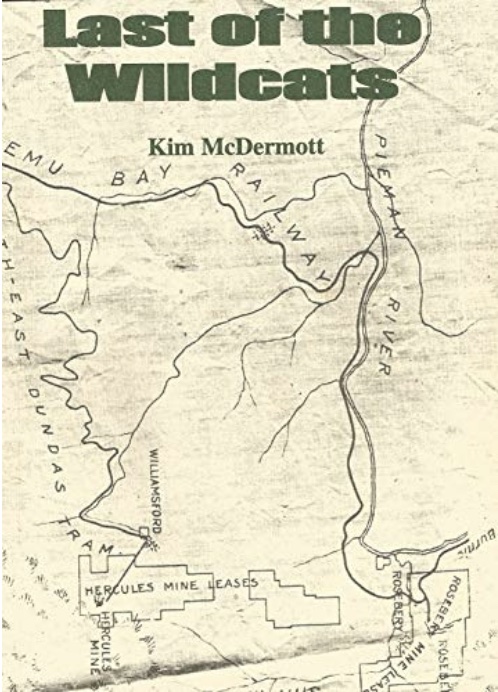
There are also a couple of newspaper articles about Harry, but because Lindsay didn’t provide specific dates, I cannot find them.
Harry Fisher was an old bushman and hermit who lived with his pack of mangy flea-ridden dogs and was well known to the Emu Bay Railway Company (EBR Co.) employees and residents of Bulgobac and Guildford on the railway line. He spent most of his time prospecting and hunting for meat with the dogs.
(Left) Cover of Kim McDermott’s book.
He was first known to live at a hut on the 25-Mile at Ringwood on Surrey Hills in the early 1950s. During the construction of the horse-drawn wooden tramway in the 1870s and many years after, Ringwood hosted a sawmill and a few worker’s huts and horse stables. It was also one of the sidings along the tramway for the changeover of horses.
Harry was forced to move by AFH in the early 1950s when Reg Needham adopted a policy of removing all lessees and itinerant users of Surrey Hills, both legal and illegal, to introduce professional forestry management.
(Right) Lyndsay Wilson with his guards cap on. He worked on goods trains before working on the Blue flyer, or West coaster, the passenger train that ran between Burnie and Rosebery in the early 1960s. Photo courtesy Herbert Illichmann.
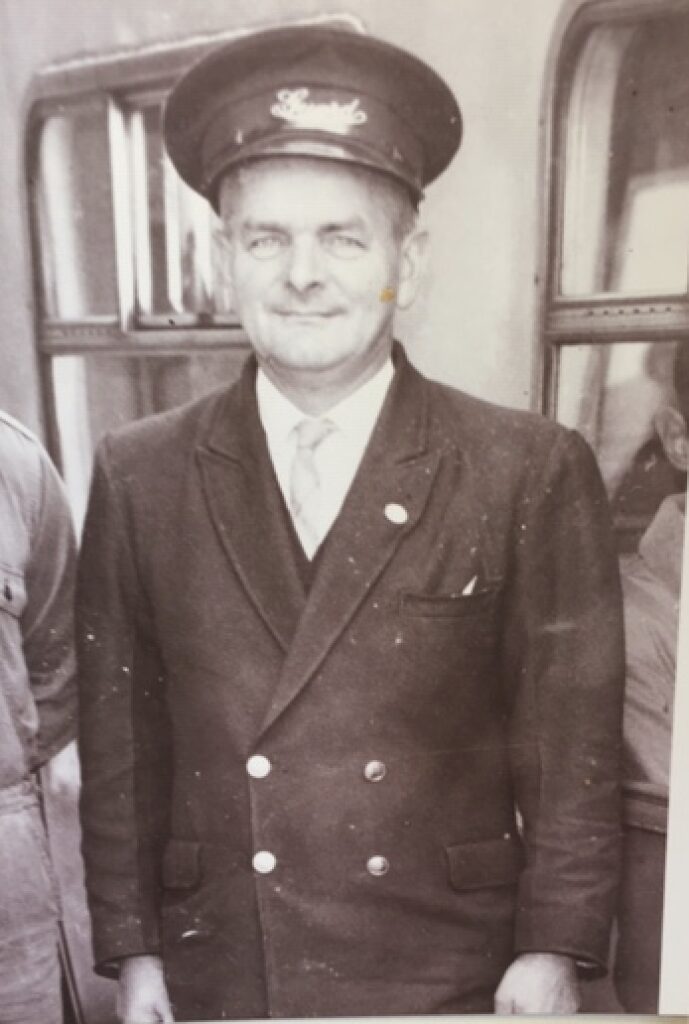
Harry moved further south to Bulgobac at the 541/2-Mile and lived in the bole of an old stump, a sheet of iron fixed to the side and some rusty iron and bark over the top. His dogs kept him warm as he slept with them at night, although there is some conjecture about this. Margaret Brown (nee Burridge) told Herbert that Tom Etchell, the brother of Luke who was a long-time resident at Guildford, was known to live in the fork of a fallen tree near Bulgobac, and he may have been confused with Harry Fisher.
Sid Young, a train driver with the EBR for 44 years from 1955, recalls Harry living at the bottom of Que River in an old hollow log about 25 miles south of Guildford.
It was said that Harry would set up camp wherever there was a thick patch of wallabies. Between him and the dogs, they would eventually clean it out, and then he would shift camp to another well-populated patch.
According to Kim:
As a prospector, who was convinced he would one day strike it rich, Harry travelled far and wide in search of his elusive lode, and train crews would often see Harry, or at least the blade of his long handled shovel, flinging clods of black peat into the air from deep in one of the miles of trenches he dug unsuccessfully across the plains of Bulgobac and Boco.
Later, on advice given by a helpful fettler, Harry moved to a rundown camp further down the line towards Boko Siding.
Kim wrote:
“Visitors to Harry’s camp were few, mainly because the only running water in the camp was a sink hole in the middle of the dirt floor fed by both a small spring and the deposits from his dog’s bladders, hence the offer of one of Harry’s cups of tea was, more than often than not, refused. On supply day, as the train approached his camp, there would be Harry, surrounded by his sea of dogs, all waiting expectantly for his provision to be bundled out of the goods van as the train passed. As the boxes hit the ground, the dogs pounced, snarling and fighting as they tried to secure a morsel from the tightly lashed bundles, and in the midst would stand Harry, cursing and screaming as he tried to retrieve his meagre provisions from his pets”.
Harry was partial to a drop of liquor, as with most bushmen leading a solitary life on the west coast. He used to have a bottle from the top shelf sent by rail where, upon delivery, he would shut the door, dogs all inside with him, and settle down to drink.
According to Lyndsay:
“Sometimes Harry travelled all the way to Burnie always travelling in a special compartment because of his fleas. One day the rail guard hardly recognized him. Harry wore a suit, had a haircut and looked very respectable. He was asked what happened. Well, he said, the police inspector’s wife gave me the suit and the haircut. All for 12/6! The local paper recorded the next day Harry Fisher was found to be drunk and disorderly and was fined 10 shillings with 2/6 cost”.
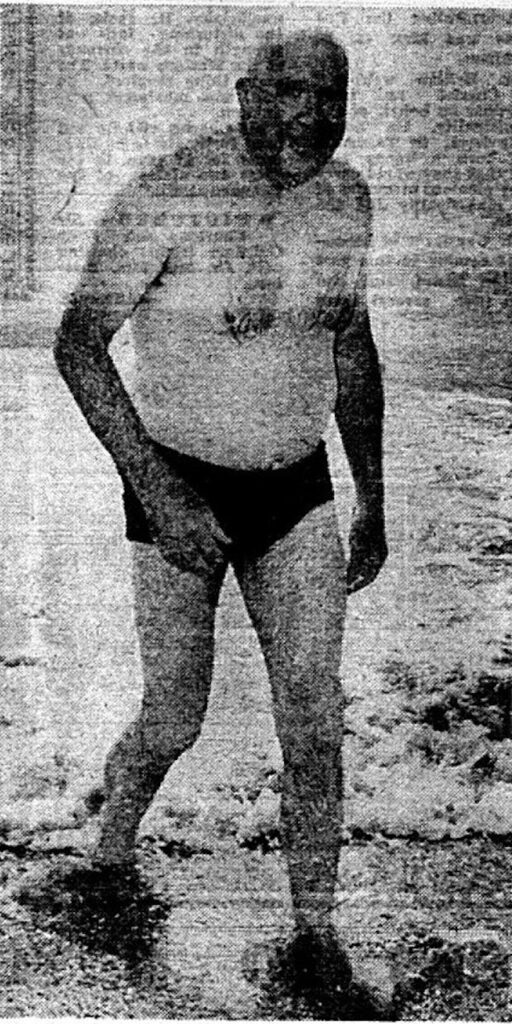
I haven’t found the newspaper report of Harry’s arrest and fine. However, with Brian Rollins’s assistance, I learned a bit more about the arresting policeman Gordon Mackey, who was well-known to residents at the time. Herbert tells me the incident happened when the Blue Flyer or West Coaster operated from 1960 to 1964.
Mackey joined the police force in 1927 and served until his retirement in 1968. He moved to Burnie in 1956 as superintendent of the North-West police district. Mackey was heavily involved in the local Burnie community and was instrumental in establishing the Burnie Police, Citizens Boys and Girls Club, and the Burnie Olympic Pool. Mackey died in 1982.
(Left) Gordon Mackey used to swim every morning at West Burnie beach for 6 months of the year.
Lyndsay continued:
“All passenger service stopped in Guildford for a cuppa and a plate of sandwiches. Not all people ate all of it, especially the crust. So once so often the scraps were packed up and sent to Harry Fisher for his dogs. When the goods were delivered, there was a fight between him and his dogs to get the best pieces. In thankfulness, he sent all his jam to Guildford to the station master”.
According to Dale Bailey, a fettler with the EBR Co., Harry had 28 dogs. The dogs, being that hungry most of the time, usually won the fight for the crusts of bread. Peter Winskill, whose family has a long association with the west coast, remembers travelling on the EBR train as a young kid in 1961 back to Tullah from the coast. He recalls seeing the train guard, most likely Algie Little, throwing out a box full of crusts for Harry and his dogs on their way past.
Lyndsay wrote that in November 1956, Harry met Prime Minister Sir Robert Menzies and his wife, Dame Pattie. They were on a re-election campaign, but if that is the case, it must have been the year earlier as there was a federal election on 10 December 1955.
(Right) The EBR Chevrolet rail motor.
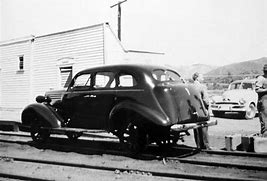
They stayed in Queenstown and were hosted by Eric Reece, and the next day travelled by car to Rosebery. The Menzies then travelled from Rosebery in the EBR Co. railmotor to Guildford, a convertible Chevrolet with no steering, driven by Allan McCormick.
Herbert recalls the railmotor taking reporters to Zeehan for a visit. He was asked to go to Bulgobac, stay overnight and stand on the railway with the EBR Co. employees living there to wait for the prime minister’s arrival. Menzies spoke with them for a few minutes. But unfortunately, none of the employees were Australian citizens and couldn’t vote anyway.
It was here where Harry’s mangy dogs accosted Sir Robert. Harry must have learned of the visit and waited, along with others, on the line. Lyndsay wrote that Dame Pattie tried to find a camera to record the interesting occasion.
I can’t find any newspaper clippings about that visit. However, Margaret Brown recalls the Prime Minister and his wife visiting Guildford in the 1940s when she was young. Her parents, who ran the canteen and refreshment bar at the railway station, hosted them in their lounge. Margaret waited on them, serving afternoon tea.
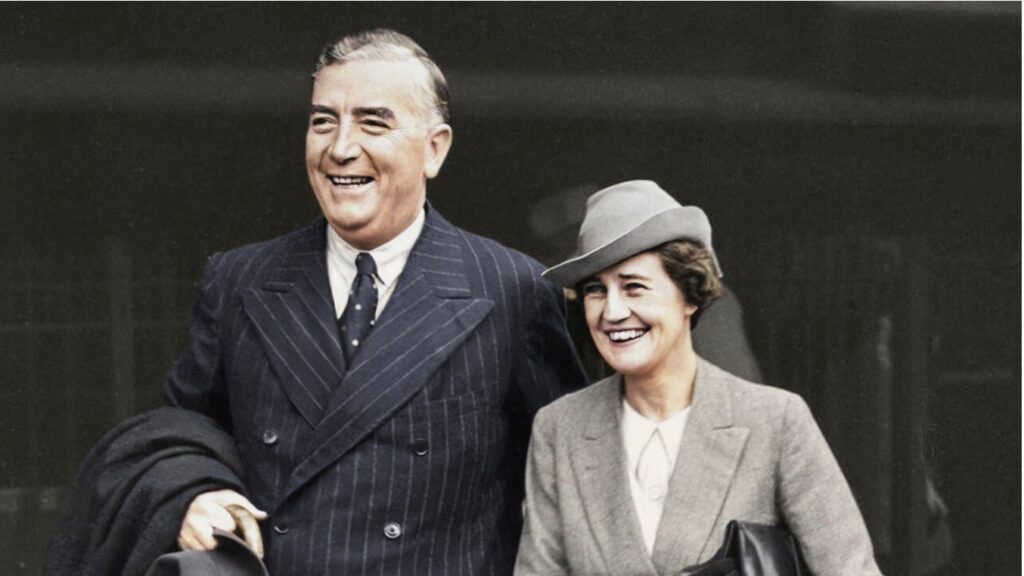
Sir Robert Menzies and his wife Dame Patti.
The Menzies visited Tasmania several times during his prime ministership, on public and private occasions. However, I cannot find any stories about their visit to Guildford or their encounter with Harry’s dogs. I would have thought both stories were newsworthy items. It would be good if anyone could share any recollections of the prime minister’s visit.
Harry had a standing order with a shop in Burnie. On one occasion, he told a rail guard to get a pair of gum boots, no size given, and not to send any soap, “as the dogs don’t like it”.
Margaret Brown tells me Harry never lived at Guildford, but he was a regular visitor to the refreshment room. He would catch the train from Boko in the morning and return later in the day, no doubt, with some bottles of beer to keep him company with the dogs.
Here is more from Lyndsay:
“The driver of the rail motor hadn’t seen him about for days, so he took his life in his hands, stopped his rail motor and went to the hut [the dogs were known to be savage]. He [Harry] was down on the floor, the dogs all over him; the Burnie hospital diagnosed him as having pneumonia and malnutrition. Two nurses told me in 1956, I was an inmate because of a terrible shunting accident, ‘You didn’t know that dirty old coot’. They told me that when he came in, fleas were jumping everywhere, so they took him and put him into a huge bath. He never had enough brains to pull out the plug. So now he was cleaned up and in bed. The nurses and Dr Hunn came to examine him. ‘Well old chap,’ says Dr Hunn, ‘how’s the water works?’ Harry says ‘Beautiful, where I come from the other side of Hampshire’. ‘No, no, old chap’, says Dr Hunn, ‘I want to know what kind of a stream you have’. ‘Beautiful’, says Harry, ‘Just down from my door, they call it the Loudwater”.
Kim wrote in his book:
“One time Harry was found, more dead than alive, on the banks of one of the many swollen creeks in the area. Apparently, he had slipped and fallen whilst panning for minerals and his dogs, long derided as posing a danger to the old prospector, had leapt in and pulled him to safety. It was not known how long Harry had lain there before Harold Jones, The Permanent Way Inspector, found him and transported him to Burnie Hospital“.
The end of his existence is a sad story, as they usually are for these hermits. According to Lyndsay:
“Everybody looked out when they passed his hut for signs of life. One Christmas, there were no signs, but his dogs were there trying to pull him out of the creek. So he was again admitted to the hospital and was not allowed to return because of his condition. It was discovered that he has relations in Launceston, and he ended up in a retirement home, which he didn’t like, and neither other inmates. Well, he was ready to go to bed when the sun went down and awake when the sun came up and that caused a few problems”.
From all reports it was a habit not appreciated by the other residents.
(Right) Charlie Crane was also a champion boxer.
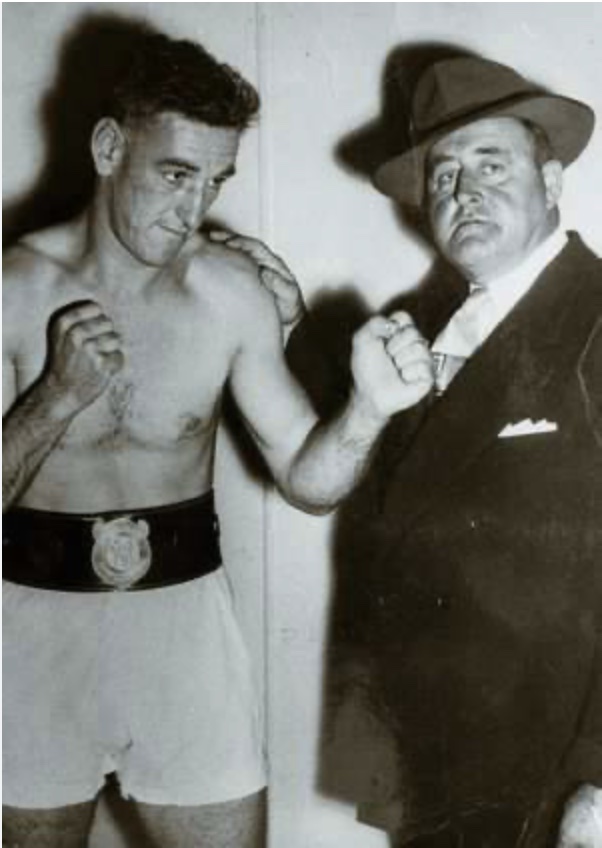
After his death, Charlie McDermott and Charlie Crane, two fallers for Arthur “Doc” Docherty from Rosebery, who owned the sawmill at Bulgobac at the time, came across Harry’s old camp site on a shooting trip:
“Entering the shadowy gloom of the hut, Charlie Crane remarked that the lack of light had affected his sight, as his cloth appeared to be moving. To the men’s horror, closer inspection revealed them to be a moving mass of fleas! Vigorously brushing away the offending parasites as they fled the building, the two men did not notice the hundreds of fleas settling comfortably in the lining of their new host’s clothes. It would be weeks before their own camp would be free of the legacy of Harry Fisher!”
That is all that is known about the bushman Harry Fisher, one of the many characters who graced the bush in and around Surrey Hills.
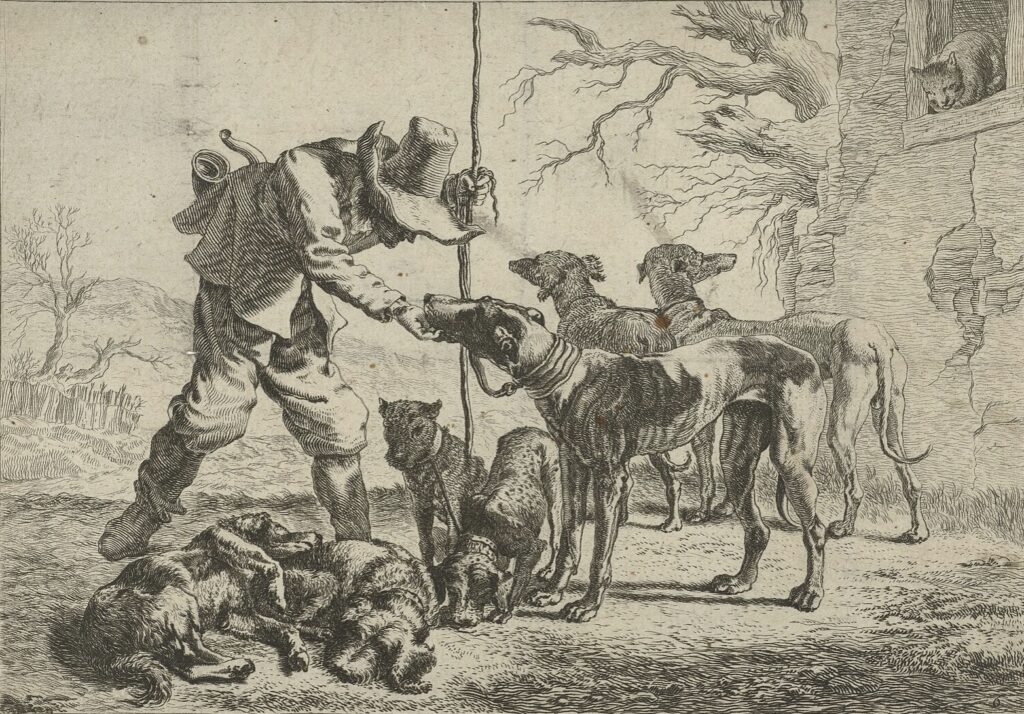
Charlie Crane is with his trainer Baden Saltmarsh in the photo.
Charlie and myself cut the power line from Roseberry to Renison Bell for Arthur Docherty.
Except that Herbert Illichman was an assitant inpector or similar and not a train driver.
I saw the dogs barking at the heels of the guards dropping Harry’s package off while waiting at Boco I cannot add.
My husband Bill told me he can remember Harry Fisher riding his horse, accompanied by his dogs, to get his plug tobacco ration and other provisions, from the post office shop that Bill’s mother had at Hampshire, in 1948-49.
Good stuff, Robert, keep up the good work.
Another interesting story. Thanks for documenting these great memories of the past.
Well done Robert. Another extraordinary piece of Tasmanian history collected for all to enjoy.